
Wednesday, December 22, 2010
Monday, December 20, 2010
Literary contest "un dito nell'occhio": the winners are...
 SIGHT: Un'ultima occhiata (Brynja, Kópavogur, ICELAND)
SIGHT: Un'ultima occhiata (Brynja, Kópavogur, ICELAND) Ho saputo che il mio babbo stava lottando contro il cancro da due anni, ma lui era sempre ottimista ed ero fiducioso che sarebbe guarito. Così ho tardato ad andare da lui, anche perchè c‘erano 400 chilometri tra noi. L‘ho spesso chiamato al telefono, e lui parlava di suoi progetti per il futuro, come al solito ~ era ancora un uomo piuttosto giovane e aveva molto da fare.
Poi mia sorella mi ha telefonato per dirmi che dovevo andare là, se volevo prendere commiato da lui. Una settimana dopo sono salito sull‘aereo diretto a nord. Durante il volo, ho usato il tempo per prendere nota di alcune cose di cui parlare con lui, una sorta di “lettere a mio padre“.
Mia sorella mi aspettava all‘ aeroporto e mi ha subito detto che nostro babbo era peggiorato ed era entrato in coma. Mi ha accompagnato in macchina velocemente fino all‘ospedale .
Mi aveva avvertito che la malattia – e il trattamento – avevano avuto un effetto negativo, però non ero preparato a quell‘aspetto che avevo di fronte. Non conoscevo quell‘uomo anziano che stava là. Solo allora, quando ho preso le sue mani, l‘ho riconosciuto come mio padre. Conoscevo bene quelle grandi e forti mani .
Mentre leggevo ad alta voce la lettera d‘addio, con le lacrime agli occhi, avrei voluto che lui mi guardasse un‘ultima volta, ma non è accaduto.
Poi mia sorella mi ha telefonato per dirmi che dovevo andare là, se volevo prendere commiato da lui. Una settimana dopo sono salito sull‘aereo diretto a nord. Durante il volo, ho usato il tempo per prendere nota di alcune cose di cui parlare con lui, una sorta di “lettere a mio padre“.
Mia sorella mi aspettava all‘ aeroporto e mi ha subito detto che nostro babbo era peggiorato ed era entrato in coma. Mi ha accompagnato in macchina velocemente fino all‘ospedale .
Mi aveva avvertito che la malattia – e il trattamento – avevano avuto un effetto negativo, però non ero preparato a quell‘aspetto che avevo di fronte. Non conoscevo quell‘uomo anziano che stava là. Solo allora, quando ho preso le sue mani, l‘ho riconosciuto come mio padre. Conoscevo bene quelle grandi e forti mani .
Mentre leggevo ad alta voce la lettera d‘addio, con le lacrime agli occhi, avrei voluto che lui mi guardasse un‘ultima volta, ma non è accaduto.
TOUCH: Risarcimento danni (Carlos, Valencia , SPAIN)
Mi piacciono le curve delle donne. Ogni mattina quando prendo l’autobus per andare a lavorare, mi appoggio su di loro, delicatamente come se non lo facessi di proposito: in fin dei conti sono cieco e quindi molto credibile. Se così non fosse, verrei sicuramente preso a schiaffi. Quando “per caso” la mia mano sfiora, col dorso, una morbida natica, il corpo della sventurata si irrigidisce, fa uno scatto nel voltarsi per reagire, ma poi vede il bastone bianco, gli occhiali scuri e accetta l’oltraggio fino alla fermata successiva.Potrò sembrarvi un approfittatore, ma dal momento che sono cieco dalla nascita, vivo questa mia depravazione come un risarcimento danni. Se avessi 10 diottrie su 10 sarei un maniaco ma così sono solo un povero disgraziato.Oggi però mi è successa una cosa strana: sono salito sul 3 in direzione ospedale, seguendo un buon profumo francese, elegante e sofisticato, sono avanzato nel corridoio centrale con il palmo della mano sinistra ciondolante, ma bello aperto e TAC, raggiungo la miglior natica della mia vita, gentile e muscolosa, stretta su una fascia di viscosa.Nell’autobus risuona un vocione: “Ehi Ray Charles quello è il mio culo!”. Mi scuso balbettando per l’imbarazzo, poi con un accento straniero il possessore di tanta perfezione, a bassa voce, mi dice: “ciao! Io sono Carlo e anche Consuelo, ti interessa l’articolo?”. Rifiuto cordialmente, ma la mia vita da oggi è più felice perché ho scoperto che mi piacciono anche le curve degli uomini!
Wednesday, December 15, 2010
Giovanni, Paolo and the mystery of the puppets: the antimafia cartoons
 Rosalba Vitellaro and Alessandra Viola are two very creative and professional Sicilian women, who are madly in love with cartoons.
Rosalba Vitellaro and Alessandra Viola are two very creative and professional Sicilian women, who are madly in love with cartoons.One day, while driving to the beach, they are listening to a song by the Sicilian songwriter Carmen Consoli dedicated to Giovanni Falcone, the prosecution Attorney killed by the Mafia. “I think it would be wonderful to make a cartoon about Falcone and Paolo Borsellino [the other D.A. killed by a mafia bomb] – says Rosalba –. The new generations do not even know who they were and what they did.” It took the two artists a longer time than expected to make the idea come true. Nonetheless, thanks to Raitrade – which presented the cartoon at the international buyer convention in Cannes and will distribute it worldwide-, Raifiction production, Larcadarte – a Palermo production company- and the Sicily region, the project was finally realized. "Giovanni e Paolo e il mistero dei pupi” is now a 26-minute long cartoon, which develops a sophisticated metaphor of good versus evil, with the magic soundtrack by Samples from Verona. Alessandra explains the project: «We want it to be a fantastic story because it needed to reach the youngest audience in school and on TV in the most efficient way. The message had to be clear and unmistakable. We didn’t want the good characters to succumb in the end, and the evil characters to be charming and fascinating. The cartoon tells the story of two best friends, Giovanni and Paolo, who in the 1950s are getting ready for the celebrations at Saint Rosalia Festival. Unfortunately, the happy atmosphere is spoiled by the evil Mago Malvagio who transforms in puppets those who ask him for help. The two children fight with all their strength to “free” the puppets and will eventually succeed thanks to the help of other children and their parents. The evil Mago Malvagio will be ultimately defeated, though his shadow will survive and will be reincarnated in another evil person.” Hence, as the cartoon wishes to teach, one should never lower its guard and be always vigilant against evil, which can take any shape, even of a shadow.
The cartoon was approved by Maria Falcone – sister of Giovanni Falcone – and by the widow Borsellino, who both were involved in the project since the beginning.
Monday, December 13, 2010
Studying languages is good for your health!

According to a recent research at the Tel Aviv University, studying a foreign language keeps the mind young. It has being discovered that elderly people who speak more than one language are lucid and alert. This is because different languages stimulate different neurological processes, thus contributing to the health of the brain, as well as a better mental flexibility. So, remember: being multilingual keeps your brain young!
Also, several medical studies show that studying foreign languages help fighting brain degenerative diseases.
Friday, December 10, 2010
It is never too late ... to learn Italian
 Italian language developed from the Vernacular languages spoken on the Italian soil in the middle Ages.
Italian language developed from the Vernacular languages spoken on the Italian soil in the middle Ages.In the 16th Century, Cardinal Pietro Bembo provided the Italian language with specific rules based on the works of the great Tuscan authors of the 14th century: Dante Alighieri, Giovanni Boccaccio and Francesco Petrarca.
In the early 19th century, Alessandro Manzoni, in his famous historic novel I Promessi Sposi (the Betrothed), brought several changes to the Italian language, lowering its register to conform it to the language spoken in his time.
For the Italian people, however, who are still used to speak a variety of local dialects, Italian became a common –national- language only in the 20th century, after WW2, thanks to the mass media and particularly to popularization of TV. One show in particular made the difference in the literacy process: “Non è mai troppo tardi” conducted by Alberto Manzi and broadcasted by RAI from 15 November 1960 to 1968. It was suspended after 484 episodes, when the increased school attendance made it less indispensable.
Friday, December 3, 2010
Marco Mengoni: Best European Act at the MTV-Europe Music Awards 2010

Marco Mengoni, winner of the third season of the Italian X-Factor, was awarded the Best European Act, at the 17th edition of the Mtv Europe Music Awards, in Madrid, on November 7th.
People from all over the world watched the incredible show, which features live performances by Shakira, Bon Jovi, Katy Perry, Ke$ha, Eminem, Justin Bieber, Marco Mengoni and many more. The awards ceremony was presented by the beautiful and lovely Eva Longoria.
If you love Italian music and you haven’t heard of Marco Mengoni yet, you can check his music on the website http://www.marcomengoni.it/
Labels:
italian language courses,
Marco Mengoni,
music,
musicians
Wednesday, November 24, 2010
Film: Profondo Rosso
 "Profondo Rosso", (also known as Deep Red or The Hatchet Murders), is the 1975 horror classic directed by Dario Argento, which earned him the title of “heir” of Alfred Hitchcock in the genre.
"Profondo Rosso", (also known as Deep Red or The Hatchet Murders), is the 1975 horror classic directed by Dario Argento, which earned him the title of “heir” of Alfred Hitchcock in the genre.Marc, a young pianist, witnesses a parapsychologist being killed, but he cannot see the face of the killer. While he investigates the homicide, with the help of an attractive female journalist, also the people he encounters are killed, one by one. The truth is unpredictable. The film is the stylistic and creative climax in Dario Argento’s work, and marks the passage from his initial “thriller” period to the more distinguished “horror” phase. The film does indeed present aspects of both genres, making it a fairly intensive cinematic experience. The cast is excellent and the plot, though sometimes overcomplicated, offers some of the spookiest creations in modern suspense cinema. Finally, a special mention need to be paid to the soundtrack by the Goblin, which is exceptionally terrifying.
Friday, July 23, 2010
Remembering the Liras
 Before Euros, Liras was the official Italian currency.
Before Euros, Liras was the official Italian currency.On 1st January 2002, when the Euro became official, both currencies circulated and were accepted for a few months. Then, on 1st March 2002, the Liras were officially withdrawn. However, Lira coins and notes can still be exchanged at the Banca d’Italia branches until 29th February 2012.
The exchange rate is 1.936,27 Italian liras to 1 Euro.
Tuesday, June 22, 2010
Diabolic Artists
 Since 1840, a single interpreter exhibition, occasionally accompanied by other instrumentalists, was named recital.
Since 1840, a single interpreter exhibition, occasionally accompanied by other instrumentalists, was named recital.Although people seemed to preferred the Academies (musical evenings with a large number of performers), the exceptional virtuosity of musicians such as Paganini at the violin and Liszt on the piano gradually changed the audience’s preferences.
Virtuosity was not only the exhibition of exceptional technical skills, rather a way of performing influenced by the Romantic ideas.
The performer’s desire was to achieve the greatest knowledge of its instrument; the execution was seen as a challenge of one’s limits to let the instrument express its potentiality, to reach the core of the music.
Quite frequently, the audience indeed believed the best virtuosos to have also demonic powers, and many were the legends and bizarre anecdotes.
Before Paganini, a famous Italian violinist from the 18th century, Giuseppe Tartini (1692-1770), wrote a sonata titled "The Devil’s Trill”, which was said to be inspired by the devil appeared in person to the composer.
Tuesday, June 15, 2010
Radio 2 and the mystery story writer Luca Crovi

On Saturdays and Sundays, from 1 pm to 1.30 pm, the second channel of Radio RAI speaks mystery. Luca Crovi presents mystery story authors and books, with its passion and expertise.
Among the many authors already interviewed are: Ben Pastor, Andrea Camilleri, Richard Mateson, Veit Heinichen, Eraldo Baldini, Bianca Pitzorno and Valerio Varesi.
If you would like to listen to some episodes in streaming or podcast, just click here.
Among the many authors already interviewed are: Ben Pastor, Andrea Camilleri, Richard Mateson, Veit Heinichen, Eraldo Baldini, Bianca Pitzorno and Valerio Varesi.
If you would like to listen to some episodes in streaming or podcast, just click here.
Friday, June 4, 2010
Pizza...untouchable!
 There are things one can not give up, even in economically tough times! For Italians, one of these untouchable pleasures is dining out with friends. According to recent statistical information about Italians’ eating habits, the numbers of people eating out have decreased but not as drastically as expected.
There are things one can not give up, even in economically tough times! For Italians, one of these untouchable pleasures is dining out with friends. According to recent statistical information about Italians’ eating habits, the numbers of people eating out have decreased but not as drastically as expected.Dining at a restaurant is still a common practice for Italians, who perceive it as something more than just eating: it means spending time with friends, it means celebrations and sharing a relaxing time...The preference goes the more economical pizzas rather than the more expensive seafood dinners; yet, the habit of enjoying a good dinner with friends is still in vogue!
Labels:
eating habits,
food and wine tasting,
Italians,
pizzas
Thursday, May 27, 2010
Let’s venture with words!
 Read the following text and fill the blanks with the words or the expressions listed below:
Read the following text and fill the blanks with the words or the expressions listed below:come un lupo - sordo - Faceva paura - tromba - felino - si slanciò - fiamme - stramazzò - con forza - In quell'istante - il pirata - pugnale
Sandokan mandò un _____________ruggito. Con un salto _____________ si impadronì di una pesante sedia e _____________ sulla tavola che stava in mezzo alla sala. _____________; i suoi lineamenti erano ferocemente contratti per il furore, i suoi occhi parevano mandare _____________ e un sorriso atroce gli errava sulle labbra. _____________si udì al di fuori uno squillo di _____________ e nel corridoio una voce, quella di Marianna, gridare disperatamente: " Fuggi, Sandokan!". _____________ sollevò la sedia e la scagliò _____________ irresistibile contro il lord, il quale colpito in pieno petto, _____________ pesantemente al suolo.
Pronto _____________, Sandokan gli fu sopra con il _____________ alzato.
E. Salgari, Le tigri di Mompracem
As usual, if you find it too difficult you can contact us anytime!
Friday, May 21, 2010
The "new" Natural History Museum in Venice
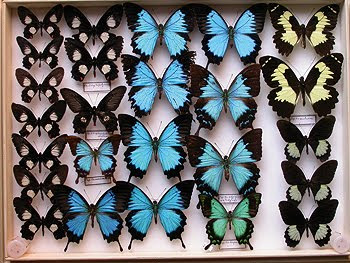 After the nearly 10 years long restoration process, the Museum of Natural History in Venice has recently reopened with a new and intriguing exposition along the eleven halls of the Fondaco dei Turchi.
After the nearly 10 years long restoration process, the Museum of Natural History in Venice has recently reopened with a new and intriguing exposition along the eleven halls of the Fondaco dei Turchi.The Museum of National History collections include about two million pieces, which cover a historic period of 700 million years. The collections have been divided in three parts:
1. The trail of life, or paleontology: the giant dinosaur and the Sahara expedition by Giancarlo Ligabue open the exhibition, which presents in chronology the appearance of the different forms of life on Earth.
2. Collect to amaze, or the evolution of the naturalistic collecting. One of the several new things in the museum is the space dedicated to Venetian explorers and collectors from the 19th century, Giovanni Miani and Giuseppe De Reali, and from today, Giancarlo Ligabue. An area is also dedicated to the birth and development of naturalistic museums.
3. The strategies of life, or forms and functions in living beings.
Wednesday, May 12, 2010
Mine Vaganti by Ferzan Ozpetek
 Mine Vaganti, the latest film by Ferzan Ozpetek, opened in the theaters on March 12.
Mine Vaganti, the latest film by Ferzan Ozpetek, opened in the theaters on March 12.The film was received with great favor at the Berlin film festival. It is a coral story and portrays the reactions of a ‘traditional family’ to the son’s unexpected revelation of his homosexuality. Set in the beautiful city of Lecce, among olive trees, “pasticciotti” and the blue sea of the nearby Gallipoli, Mine Vaganti narrates intensely and lightly at the same time a cross-section of Italian society, still intensely homophobic, and fogged by clichés.
Once again, Ozpetek brings on the scene a family, seen as an extended family to include friends as well as blood-related relatives, who care not so much for the sexual orientation of their son, brother and friend, as for his happiness. Once there is happiness, Ozpetek clearly states, everything else is secondary.
Wednesday, May 5, 2010
Terre della Venezia Orientale
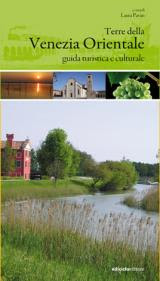 Terre della Venezia Orientale. Guida turistica e culturale (€ 14,50), edited by Laura Pavan (Ediciclo Editore), is the perfect guidebook for those who want to discover the eastern part of the Veneto region, its art, its wines and its gastronomy.
Terre della Venezia Orientale. Guida turistica e culturale (€ 14,50), edited by Laura Pavan (Ediciclo Editore), is the perfect guidebook for those who want to discover the eastern part of the Veneto region, its art, its wines and its gastronomy.The book will guide you through the territory between the rivers Sile and Tagliamento, and the many small cities and towns of the area, from San Donà to Portogruaro, and along the shore, from Cavallino-Treporti to Bibione, including also Caorle.
Terre della Venezia Orientale, published with the support of the province of Venice, combines scientific information with a clear and easy to read style. The numerous photographs, detailed maps of the itineraries of the territory and maps of the main cities make it an extremely user-friendly tool for the tourist.
There are four suggested itineraries: from the Sile river to the Piave river; from the Piave river to the Livenza river; from the Livenza river to the Lemene river, and from the Lemene river to the Tagliamento river. Each itinerary begins from a town on the coast and goes inland following the river. At the end of each itinerary, the reader can find a section dedicated to the typical products of the area and useful information (addresses and phone numbers of tourist offices, museums and cultural institutions, parks, markets, fairs and cultural events calendar).
The guidebook is also available in English, German and Slovenian.
Labels:
art,
Bibione,
Caorle,
Cavallino-Treporti,
Ediciclo,
itineraries,
Livenza,
maps,
photographs,
Portogruaro,
San Donà,
Tagliamento,
Terre della Venezia Orientale,
Veneto,
Venice,
wine
Thursday, April 29, 2010
magari
 In each language there are words that escape a clear univocal definition and a precise use. This is the case in Italian of “magari”.
In each language there are words that escape a clear univocal definition and a precise use. This is the case in Italian of “magari”.To look for help, we turned to the good old dictionary Devoto-Oli
MAGARI (ma-gà-ri)
It expresses:
a strong desire, felt as unrealizable “magari potessi andare!”[I wish I could go!]
an enthusiastic adhesion/acceptance: “vorresti venire con noi?” “Magari” [Would you like to come with us? Absolutely!]
a moderate assent “prendiamo un aperitivo?” “Magari” [shall we have an aperitif? alright]
2. It functions as adverb in parenthetical position as perfino, addirittura : “loro, magari, ti diranno che non lo sanno” [they will even say to you that they don’t know it]
The word magari comes from the Greek “makárie” vocative of “makários” meaning happy.
Labels:
Devoto-Oli,
dictionary,
italian grammar,
Italian words,
language class,
magari
Thursday, April 22, 2010
...alea iacta est!
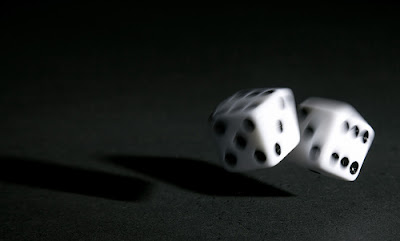 In 49 B.C., on the shores of the river Rubicone (Romagna), which marked the border between Italy and Gallia Cisalpine, Julius Cesar stated the famous sentence: “Alea iacta est”, that is: “the dice is cast”. Crossing the Rubicone meant to violate the law that prohibited armed men to enter the Italian soil, hence Cesar’s action marked the beginning of the civil war, which brought the end of the Roman Republic and the beginning of Cesar’s dictatorship.
In 49 B.C., on the shores of the river Rubicone (Romagna), which marked the border between Italy and Gallia Cisalpine, Julius Cesar stated the famous sentence: “Alea iacta est”, that is: “the dice is cast”. Crossing the Rubicone meant to violate the law that prohibited armed men to enter the Italian soil, hence Cesar’s action marked the beginning of the civil war, which brought the end of the Roman Republic and the beginning of Cesar’s dictatorship.The sentence still refers to actions that cannot be undone.
Labels:
Alea iacta est,
border,
Italy,
Julius Cesar,
latin words,
Romagna,
Rubicone,
sentence
Tuesday, April 13, 2010
loan-words
 Italian words, that do not come directly from Latin mostly, come from the languages of the populations Italians came in contact directly or indirectly throughout the centuries.
Italian words, that do not come directly from Latin mostly, come from the languages of the populations Italians came in contact directly or indirectly throughout the centuries.These words are called loan-words or precisely:
-integrated loan-words are words that have phonetically adapted into Italian, that is they have taken an Italian spelling and pronunciation, thus they have acquired also gender (masculine and feminine) and number (singular and plural). These words are for instance "giardino" (from franco-provencal jardin), "bistecca" (from English beefsteak) and "zucchero" (from arabian súkkar);
-non-integrated loan-words are words entered only recently in the Italian languages, thus they have maintained their original form (spelling, and sometimes also pronunciation). They are always masculine and invariable (do not change from singular to plural). These words are for instance "dessert" (from French dessert), "golpe" (from Spanish golpe), "sport" (from English sport), "würstel" (from German würstel) and "robot" (from Czech robot).
Friday, April 2, 2010
Thursday, April 1, 2010
Grammar and coffee
 For Italians, only a cup of coffee really starts their day. At home or in the Italian bars, millions of Italians stop briefly to enjoy the aroma before sipping slowly their coffee. Only then, the day really begins.
For Italians, only a cup of coffee really starts their day. At home or in the Italian bars, millions of Italians stop briefly to enjoy the aroma before sipping slowly their coffee. Only then, the day really begins.Complete with the direct or indirect object pronouns this brief story about coffee, from “Grammatica pratica della lingua italiana” by Susanna Nocchi (Alma Edizioni-Firenze).
As usual, if you need help, please contact us!
Il caffè di Piero
Che bellezza! Il mio primo caffè della giornata! Ho preso la moka,______ ho riempita di acqua, ho messo il filtro e poi ho aggiunto il mio caffè preferito: Arabica.
______ piace questa miscela, ______ bevo ogni giorno.
E’ l’unica che ______ tiene sveglio e ______ fa affrontare bene la giornata.La mia ragazza invece è salutista, dice che il caffè non ______fa bene, che ______ rende nervosa e beve solo tè deteinato.
Sì! Avete capito bene: tè deteinato, un’offesa all’italianità!
Sì! Avete capito bene: tè deteinato, un’offesa all’italianità!
Volete mettere con il piacere di preparare la moka, sentir______ mentre fa il caffè e sentire il profumo del caffè che riempie la stanza… poi versar______ nella tazzina, senza zucchero naturalmente. E, finalmente, ber______ mentre ti svegli lentamente… questo sì che è un piacere della vita.
Labels:
aroma,
coffee,
direct object,
grammatica,
indirect object,
italian grammar,
Italians
Friday, March 26, 2010
La Fenice reborn from its ashes
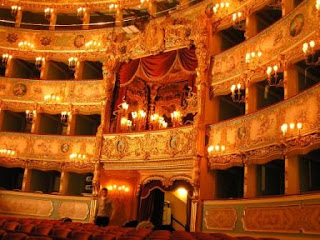 It was 29 January 1996, when the Teatro La Fenice in Venezia was completely destroyed in an arson started by an electrician working at the renovation.
It was 29 January 1996, when the Teatro La Fenice in Venezia was completely destroyed in an arson started by an electrician working at the renovation.All the major national institutions worked to guarantee the re-construction of the beautiful theatre, and after 8 years the theatre was finally re-built. On 14 December 2003, the new Fenice was inaugurated before the then President of the Republic Carlo Azeglio Ciampi, with a concert directed by Riccardo Muti. Since 1st January 2004, to celebrate the re-edification of the theatre, every New Year’s Day the Concerto di Capodanno takes place to enhance with opera pieces the famous symphonic concert at the Musikverein in Vienna. If you are in Venice stop by Campo San Fantin (San Marco), and enjoy a tour of the Fenice and maybe even a show !
Friday, March 19, 2010
Italy’s three capitals
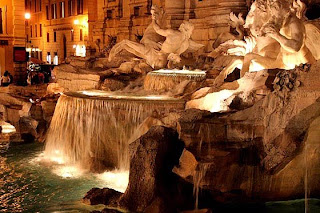 The unification of Italy followed the events of the years 1860 and 1861.
The unification of Italy followed the events of the years 1860 and 1861.At the first convocation of the Italian Parliament (in February 1861), Vittorio Emanuele II was proclaimed king of Italy.
In 1866, after the Third Independence War, Veneto and part of Lombardy were taken from the Austrian-Hungarian Empire and incorporated into the Italian kingdom.
In 1870, with the defeat of Rome, Lazio was subtracted from the Church State and included in the Italian Kingdom.
Roma became the official capital of Italy, after Torino, which was the capital city from 1861 to 1865, and Firenze, capital from 1865 to 1870.
Friday, March 12, 2010
The stolen grammar
 There is a small town where punctuations marks and grammar words are mysteriously disappearing. Thus, every morning, Mr. Giacomo, the elementary teacher, and his pupils work to recover single pieces of the lost grammar.
There is a small town where punctuations marks and grammar words are mysteriously disappearing. Thus, every morning, Mr. Giacomo, the elementary teacher, and his pupils work to recover single pieces of the lost grammar.From the children TV-show on language learning on Rai 3, written and directed by Corrado Veneziano, comes the book "Accipicchia, ci hanno rubato la lingua" -with dvd- (Giunti Junior 2009, 12 Euros), an enjoyable little text on the mysteries of languages.
Monday, March 1, 2010
Calvino’s five senses
 It is one of the least known books by Italo Calvino, actually to be precise it is not even a book, rather a "collection of notes"written during a conference in 1983. It is "Sotto il sole giaguaro".
It is one of the least known books by Italo Calvino, actually to be precise it is not even a book, rather a "collection of notes"written during a conference in 1983. It is "Sotto il sole giaguaro".Here it is how Calvino himself introduces the story:
"Un libro che sto scrivendo parla dei 5 sensi, per dimostrare che l'uomo contemporaneo ne ha perso l'uso. Il mio problema scrivendo questo libro è che il mio olfatto non è sviluppato, manco di attenzione auditiva, non sono un buongustaio, la mia sensibilità tattile è approssimativa, e sono miope."
We highly recommend this charming reading that you will surely enjoy: an authentic sensory experience!
Wednesday, February 24, 2010
Film: “Baciami ancora”
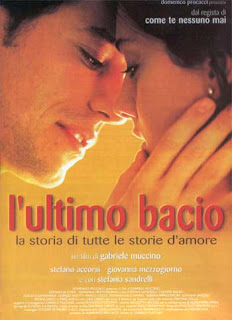 If you enjoyed the film "L'ultimo bacio" you would probably be interested to know that on January 29 the sequel "Baciami ancora” was released in Italian movie theatres.
If you enjoyed the film "L'ultimo bacio" you would probably be interested to know that on January 29 the sequel "Baciami ancora” was released in Italian movie theatres.The lives of Carlo and Giulia and of their friends proceed amid mistakes, achievements, desires and disillusions, which change them from young adults unwilling to grow into real adult.
The soundtrack of the film is by Lorenzo Jovanotti.
Enjoy it!
Labels:
baciami ancora,
Italian films,
Jovanotti,
l'ultimo bacio,
Lorenzo,
music,
sequel,
soundtrack
Wednesday, February 17, 2010
Superstitions
 As any other peoples, also Italians have their own superstitions.
As any other peoples, also Italians have their own superstitions.In Italy, the number 17 means bad luck, because in roman numbers (XVII) it uses the same character of the Latin word VIXI, which means “I lived” (thus, now I am dead). Thus, Italians avoid the number as much as they can: in hotel rooms, plane seats and even in everyday life.
Another superstition involves broken mirror.
It was the Romans who decided that a broken mirror means 7 years of bad luck. Indeed, it was one of their beliefs that life starts anew every 7 years. Hence, because a broken mirror means that health has been damaged, it would take 7 years to be again as healthy as before.
Labels:
17,
7 years,
bad luck,
broken mirror,
history,
Italian superstitions,
latin words,
roman numbers,
VIXI,
XVII
Wednesday, February 10, 2010
Buon appetito!
 Upon request, we share the recipe of a traditional local dish: “sarde in saor” (Venetian Style sardines).
Upon request, we share the recipe of a traditional local dish: “sarde in saor” (Venetian Style sardines).It is generally eaten as a starter or antipasto but it could also be served as main course.
Sarde in saor (Jewish-Venetian antipasto)
Ingredients:
1 kg of big fresh sardines
700g onion
50g pine nuts
50g raisins
2 glasses of wine vinegar
Preparation
Clean and gut the sardines. Remove the heads. Flour the sardines and fry them in oil. Rinse and dry the excess oil. Add vinegar, pine nuts and raisins. In a serving dish, alternate a layer of sardines and a layer of sautéed onions until you have laid all the sardines. Top with the remaining onions. Let it marinate and serve cold.
Sarde in saor (Jewish-Venetian antipasto)
Ingredients:
1 kg of big fresh sardines
700g onion
50g pine nuts
50g raisins
2 glasses of wine vinegar
Preparation
Clean and gut the sardines. Remove the heads. Flour the sardines and fry them in oil. Rinse and dry the excess oil. Add vinegar, pine nuts and raisins. In a serving dish, alternate a layer of sardines and a layer of sautéed onions until you have laid all the sardines. Top with the remaining onions. Let it marinate and serve cold.
Wednesday, February 3, 2010
Songs and grammar: ti vorrei sollevare
 Here are the lyrics of Elisa’s 2009 popular song (feat. Giuliano Sangiorgi) TI VORREI SOLLEVARE.
Here are the lyrics of Elisa’s 2009 popular song (feat. Giuliano Sangiorgi) TI VORREI SOLLEVARE.Some words are missing.
Conjugate the verbs in parenthesis in the proper tense (passato prossimo, or imperfetto), then listen to the song, and check if you did it right.
Mi (lasciare) _________ senza parole
come una primavera
e questo è un raggio di luce
un pensiero che si riempie di te
E l’attimo in cui il sole
diventa dorato
e il cuore si fa leggero
come l’aria prima che il tempo
ci porti via
ci porti via
da qui
Ti vorrei sollevare
Ti vorrei consolare
Mi (dire) _________ti (vedere) _________ cambiare
Tu non stai più a sentire
per un momento avrei voluto
che fosse vero anche soltanto
un po’
Perché ti (sentire) _________ entrare
ma (volere) _________ sparire
e invece ti (vedere) _________ mirare
invece ti (vedere) _________ sparare
a quell’anima
che (dire) _________ che non ho
Ti vorrei sollevare
Ti vorrei consolare
Ti vorrei sollevare
Ti vorrei ritrovare
vorrei viaggiare su ali di carta con te
sapere inventare
sentire il vento che soffia
e non nasconderci se ci fa spostare
quando persi sotto tante stelle
ci chiediamo cosa siamo venuti a fare
cos’è l’amore
stringiamoci più forte ancora
teniamoci vicino al cuore
come una primavera
e questo è un raggio di luce
un pensiero che si riempie di te
E l’attimo in cui il sole
diventa dorato
e il cuore si fa leggero
come l’aria prima che il tempo
ci porti via
ci porti via
da qui
Ti vorrei sollevare
Ti vorrei consolare
Mi (dire) _________ti (vedere) _________ cambiare
Tu non stai più a sentire
per un momento avrei voluto
che fosse vero anche soltanto
un po’
Perché ti (sentire) _________ entrare
ma (volere) _________ sparire
e invece ti (vedere) _________ mirare
invece ti (vedere) _________ sparare
a quell’anima
che (dire) _________ che non ho
Ti vorrei sollevare
Ti vorrei consolare
Ti vorrei sollevare
Ti vorrei ritrovare
vorrei viaggiare su ali di carta con te
sapere inventare
sentire il vento che soffia
e non nasconderci se ci fa spostare
quando persi sotto tante stelle
ci chiediamo cosa siamo venuti a fare
cos’è l’amore
stringiamoci più forte ancora
teniamoci vicino al cuore
Labels:
activities,
Elisa,
filling blanks,
game,
Giulian Sangiorgi,
grammar,
imperfetto,
lyrics,
music,
passato prossimo,
playing,
songs,
ti vorrei sollevare
Wednesday, January 27, 2010
Find out if you are a Latin lover
 In addition to being very passionate, the real Latin lover is extremely creative in his seductive techniques, made of precise strategies and elegant attentions and courtesies.
In addition to being very passionate, the real Latin lover is extremely creative in his seductive techniques, made of precise strategies and elegant attentions and courtesies.He is an old-fashioned character, and only a few are still alive. Are you one of them?
This test will help you find out:
What do you wear on your first date?
a. something that emphasizes your body
b. you decide at the last minute
c. a pair of jeans and a shirt
You woke up in a bad mood:
a. you turn on the stereo and select a song that would give you energy
b. you select a song that is slow and sweet
c. you take a shower hoping this will wash away your sad mood
You are very attracted to a woman and she is attracted to you; you have just met:
a. you wait for her to step up
b. you make the first move
c. you wait to see how the situation would develop
Do you believe in friendship between a man and a woman?
a. no
b. it is possible, but there is always an attraction
c. yes
If you were to associate an image to love, what would that be?
a. a cloud
b. a ball
c. a house
Profile A
You enjoy seducing. However, when the situation becomes serious, you run away afraid of being hurt in the future. Do not run! Let it be and live your life!
Profile B
You start very fast and you may scare people away. You know that loves come and go, yet you live them thoroughly. Each day can bring a new love! You are the real Latin lover.
Profile C
You warm up gradually. You don’t believe in love at first sight. Your favorite moment in the relationship is not the exiting beginning, but the present: this is the base for a solid future. You believe in long-lasting serious relationships.
Thursday, January 21, 2010
attimino?!

“Attimo” (instant) means a “brief fraction of time” and comes from Greek “atomos”, indivisible quantity. Thus, the diminutive “attimino” is meaningless, as “attimo” already indicates the most brief and indivisible fraction of time. It is even more incorrect the (very frequent) use of “attimino” as synonym of “un po’” (a little):
Es. E’ un attimino antipatico; Sono un attimino stanco ( He is a little unfriendly, I am a little tired)
From De Giuli, Guastalla, Naddeo, Magari! Corso di lingua e cultura italiana di livello intermedio e avanzato (Firenze: Alma Edizioni)
From De Giuli, Guastalla, Naddeo, Magari! Corso di lingua e cultura italiana di livello intermedio e avanzato (Firenze: Alma Edizioni)
Saturday, January 16, 2010
Italian fashion “tarots”
 Tarots are playing cards used to foresee the future ... but the word “tarot” has been used recently also to define counterfeits, in particular fake designer brand clothes and accessories.
Tarots are playing cards used to foresee the future ... but the word “tarot” has been used recently also to define counterfeits, in particular fake designer brand clothes and accessories.Yet, designers Dolce and Gabbana, or D&G, have shuffled the cards one more time, by naming the perfumes of their collections Anthology Fragrance according to the ancient Marseilles tarot cards.
n. 1 Le Bateleur is a fresh fragrance, with hints of citron, cantaloupe and vetiver;
n.3 L’imperatrice is a sweet eau de toilette, with hints of watermelon, kiwi, rose, musk and cyclamen, a perfect gift for ambitious women;
n.6 L’amoreux mixes bergamot, rose pepper, cardamom and juniper, and also birch leaves, wood and musk; it is the scent of tormented souls;
n. 10 La Roue de la Fortune blends tuberose, gardenia, and jasmine with Spicewood, patchouli, a pinch of banana and candied citrus fruits... very passionate!
n.18 La Lune proposes a mixture of lily, tuberose, sandal, musk and leather; the smell of freedom!
Testimonials (all in the nude) of the new fragrances are: Tyson Ballou, Naomi Campbell, Noah Mills, Eva Herzigova e Fernando Fernandes, Claudia Schiffer.
If none of these fragrances fits your personality, just be you patient: there are 17 more tarots still to be launched!
Thursday, January 7, 2010
Comics: Dylan Dog, the detective of the supernatural

He has the face of Rupert Everett, he is a detective and he is English. He is Dylan Dog, a former Scotland Yard agent with a mysterious past of which little is known. He investigates cases crossing to a supernatural and horrific world: he fights vampires, werewolves, and phantoms, but also more dangerous monsters such as racism, indifference and greed for power.
Dylan Dog loathes violence, plays the clarinet and is perpetually building a miniature galleon that he will probably never finish.
A former alcoholic, he warns against the dangers of alcoholism, whenever he can, and does not smoke either; he is also an environmentalist and a dedicated animalist.
Dylan Dog is the protagonist of a famous Italian cartoon strip created by Tiziano Sclavi in 1986, and published by Sergio Bonelli.
Its success is never-ending...
Dylan Dog loathes violence, plays the clarinet and is perpetually building a miniature galleon that he will probably never finish.
A former alcoholic, he warns against the dangers of alcoholism, whenever he can, and does not smoke either; he is also an environmentalist and a dedicated animalist.
Dylan Dog is the protagonist of a famous Italian cartoon strip created by Tiziano Sclavi in 1986, and published by Sergio Bonelli.
Its success is never-ending...
Subscribe to:
Comments (Atom)



